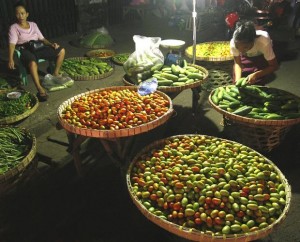Carbon vendors oppose pricing plan on veggies

A vendor prepares tomatoes and other vegetables to sell to customers at the Carbon Public Market. (CDN FILE PHOTO)
Vendors at the Carbon Public Market in Cebu City are not in favor of putting suggested retail prices (SRPs) on agricultural products particularly on spices and vegetables.
“It (SRP) is OK in supermarkets because the products there do have ‘fixed prices.’ But in public markets like here in Carbon, we do not have ‘fixed prices’ because we apply the hangyo (haggle) system,” said Rogelio Lequigan, Carbon Market Vendors Association head.
Lequigan was reacting to reports that the Department of Trade and Industry in Cebu is conducting a study about the possibility of putting SRPs on agricultural products sold in public markets to avoid overpricing.
SRPs are not really “fixed” because these vary on the supply and demand. But Lequigan said through this pricing method, customers cannot haggle with the vendors.
He said that in Carbon Public Market, buyers, especially regular customers, are free to negotiate with the vendors to lower the price of commodities they want to buy.
“If there is an SRP, the customers can no longer ask for a lower price. Everything is fixed,” said Lequigan.
He also said that vegetables and spices are seasonal and their prices vary.
“The law of supply and demand really applies here. The products are seasonal and for a particular period, spices might be abundant. In the next months, other kinds of vegetables might be abundant. We adjust our prices depending on the supply,” said Lequigan, who also noted the unpredictable climate as a great factor in the availability and pricing of agricultural products.
Zaide Bati-on, DTI-Cebu Province spokesperson, said that the matter is still being looked into by their head office.
Bati-on said they are only responding to the request of the Department of Agriculture, which sent the necessary data to Manila which will be included in the conduct of the study.
Meanwhile, Bati-on said that SRP of processed milk has already increased between 0.55 percent and 7.99 percent or P0.4 to P4.30 per item depending on the brand.
She said the manufacturers originally asked for a 9 to 12 percent increase but DTI only granted a lower price percentage.
“We based the adjustment of SRPs in the world market. If the raw products or the finished products have increased in the world market, most likely, we would adjust the price. But we anchor our price adjustment in a win-win solution for both consumers and manufacturers. Most of our skimmed milk are imported and are already expensive,” said Bati-on.
Related Stories:
Poor harvest forces farmers to hike prices
‘Timbangan ng bayan’ eyed for Tabunok public market
Disclaimer: The comments uploaded on this site do not necessarily represent or reflect the views of management and owner of Cebudailynews. We reserve the right to exclude comments that we deem to be inconsistent with our editorial standards.
